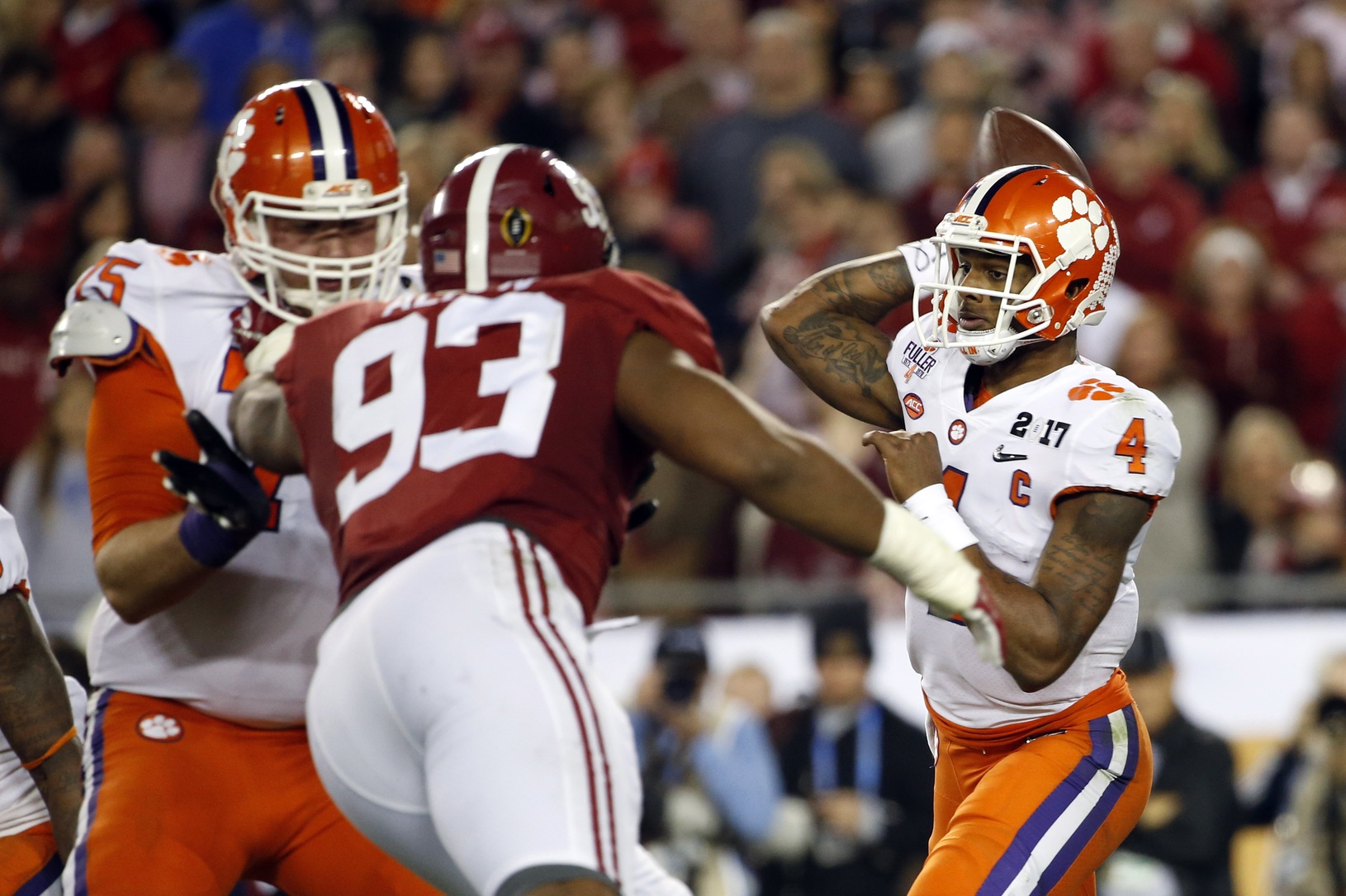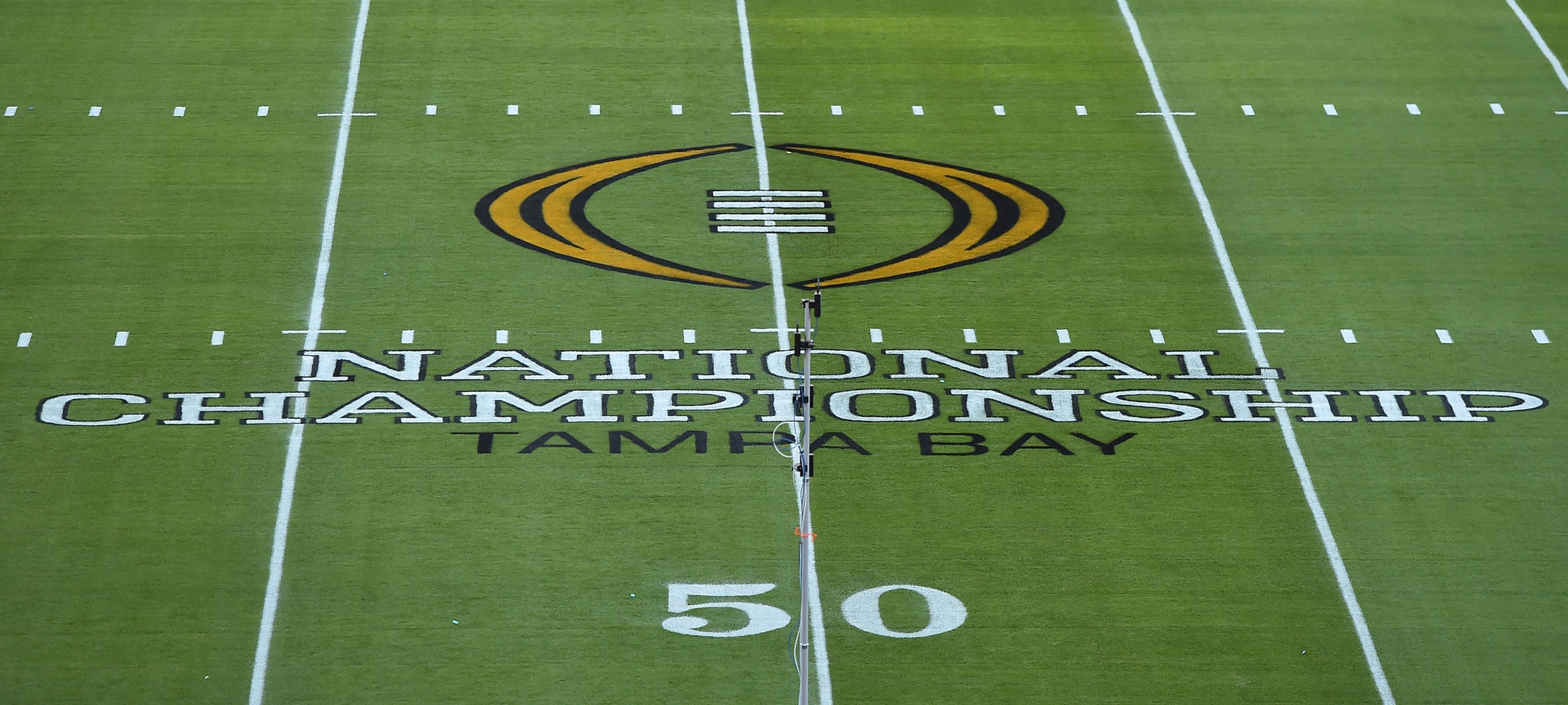
Make College Football Great Again: No more stopping clock after first downs
Four hours and eight minutes. That’s how long it took for Clemson to upset Alabama in the College Football Playoff National Championship.
For every highlight delivered by Tigers quarterback Deshaun Watson in what was an electric fourth quarter, there were twice as many excruciating clock stoppages. Commercial breaks. Replay reviews. Oh, those endless replay reviews.
Some clock stoppages are required, of course. The only reason these games exist is the fact that Fortune 500 companies shell out millions of dollars to sponsor everything in sight. DVRs haven’t killed off commercial breaks just yet. Replay is also mandatory in this day and age, although surely there’s a way to speed those up a bit.
However, stopping the clock after each first down is an antiquated notion. It’s long past time for that rule to be changed.
With 2:07 left in the fourth quarter and the Crimson Tide leading 31-28, Clemson took possession. ‘Bama fans wondered if their defense could make one last stand. Tigers fans wondered if their offense would stay hot.
But at no point did anyone in Raymond James Stadium wonder if Watson and Co. had enough time to score. The way the game is played today, 2:07 is an eternity. If anything, Clemson might score quicker than necessary and leave a little too much time on the clock for the Tide to eventually pull it out in the end.
The Tigers essentially run a two-minute drill as their base scheme. Nothing needed to be changed going into that final drive.
It took them exactly 2:06 to score the game-winning TD. An argument can be made that Clemson wasn’t moving fast enough and actually let precious seconds slip away. Watson was bailed out by some sick catches from Mike Williams and Jordan Leggett.
One of the reasons for the Tigers emerging victorious was the fact that the Alabama defense was on the field for 99 plays. The Crimson Tide hadn’t allowed an offense to run more than 84 in any other game in 2016. Even future first-round draft picks like Jonathan Allen (below) and Reuben Foster only have so much gas in the tank.

Credit: Kim Klement-USA TODAY Sports
By comparison, in the divisional round of the NFL postseason this past weekend, eight teams ran an average of 62.3 plays.
The Atlanta Falcons, an offensive juggernaut by today’s professional standards, led the way with 69 plays. The Kansas City Chiefs, arguably the weakest club offensively on display, only snapped the ball 49 times.
In 60 minutes of football, Clemson literally ran more than twice as many plays in a college game as the Chiefs did in a pro game — a playoff game, no less. By the way, this wasn’t some crazy outlier for the Tigers. They averaged 82.9 plays per game this past year, which ranked ninth nationally. Baylor topped the list with 88.6, which is nuts.
A typical NFL offense runs about 60-65 plays per game. In terms of actual snaps, some college teams are playing a game and a half every Saturday.
Player safety is an issue that has been addressed at both the collegiate and NFL levels. Each has concussion protocol, even if its effectiveness has been questioned. Additional steps have been made to eliminate helmet-to-helmet hits altogether.
But more plays equals more fatigue. More fatigue equals more injuries. More injuries — especially head injuries, as we’ve seen in the NFL — equals more lawsuits. Risk has increased exponentially for college players in recent years. They used to suit up for 11-12 games with 120-130 total plays. Now it’s 13-14 games with 150-170 total plays.
The offensive-minded New Orleans Saints led the NFL this season with 69.1 plays per game. There are 128 FBS programs, and 104 ran that many or more.
Seemingly every school in America employs some sort of no-huddle, hurry-up, spread-option system. Huddles and snaps from center have gone the way of dropkicks and wishbone formations. The game has been modernized offensively.

Jasen Vinlove-USA TODAY Sports
It’s time for the rules to reflect said modernization. While I’m all for keeping the college game unique from the pros, this is one thing the NCAA should adopt from the NFL. No more stopping the clock to move the chains after a first down. If you want to add a two-minute warning to each half, fine. There’s enough scoring already.
Too many college games creep into four-hour territory. Three should be the goal. More often than not, NFL games finish in around three hours.
Attention spans are getting shorter, yet college games are getting longer. You shouldn’t be able watch the start of the first quarter in the locker room, play a round of golf and then still catch the end of the fourth quarter at the 19th hole.
(For all you millennials out there, a round takes about four hours. I know most of you only play golf on Xbox.)
No more stopping the clock after first downs means faster games. No more stopping the clock after first downs means fewer plays. No more stopping the clock after first downs means fewer injuries. Not only would it be better entertainment for the fans, but it would be a safer brand of football for the players.
The NFL should be leading the charge, too. It would force Watson to play more like Drew Brees toward the end of each half.
With no clock stoppages after first downs, the middle of the field may not be available on passing plays. With no clock stoppages after first downs, scrambling might be risky unless there’s a clear path to the sideline.
There are still more than enough ways for the college game to stand apart from the pro game. Keep the one-foot-in-bounds rule on catches instead of two. Keep the chip-shot extra points instead of moving them back. Keep the wider hash marks. Keep the insane overtime format, although a tweak or two there would certainly be welcome.
But no more stopping the clock after first downs. A longer game is harder to watch, not to mention more dangerous to play.
John Crist is the senior writer for Saturday Down South, a member of the FWAA and a voter for the Heisman Trophy. Send him an e-mail, like him on Facebook or follow him on Twitter.
